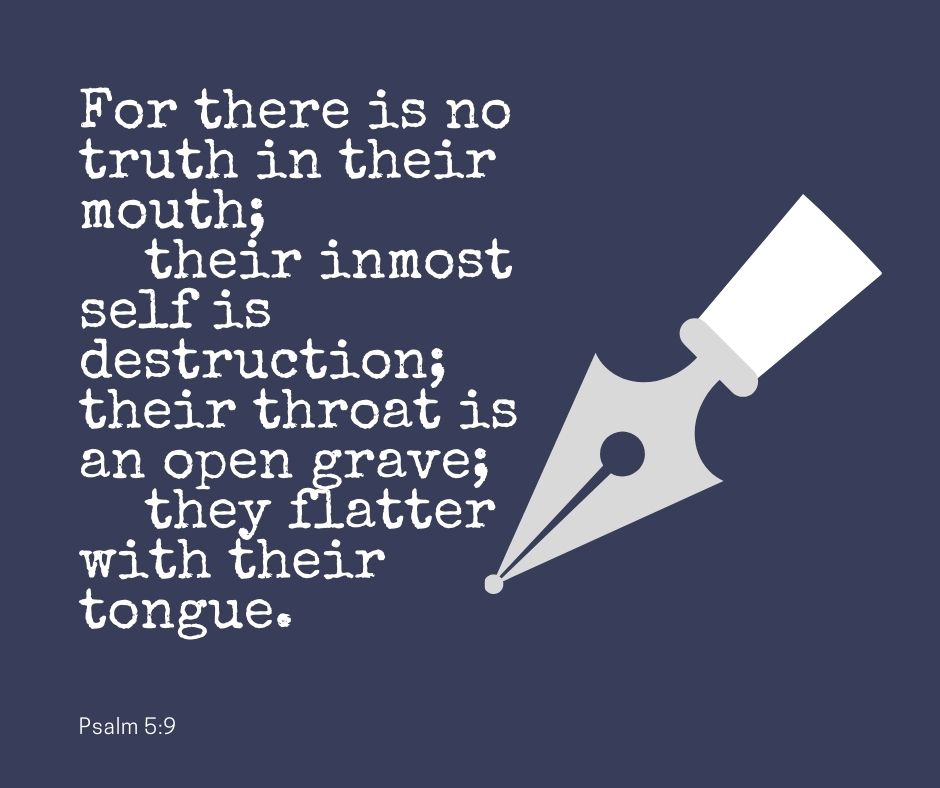“For there is no truth in their mouth; their inmost self is destruction; their throat is an open grave; they flatter with their tongue.”
Psalm 5:9
In the previous devotional in this series, the tongue was a pen. This month, it is a tool for sinful flattery wielded by boastful evildoers. Words are versatile. As writers, we know that; our careers depend on it. Because words can be used for good and evil, we must type them carefully and thoughtfully.
In Psalm 5, the writer chooses powerful words to describe evildoers. They are liars with a desire for destruction (6, 9). Words like “destroy,” “abhor,” and “hate” communicate God’s feelings toward those who speak evil (5-6). The antagonist is bloodthirsty. His throat is an open grave (6, 9). The vivid imagery of God’s Word builds a complete picture. Those who speak lies and flattery are guilty and deserve to be cast out (6, 9, 10).

Use Your Words for Good, not Evil
In contrast, the protagonist calls upon God to let those who take refuge in Him rejoice and sing for joy (11). These words of praise come from the righteous, who are protected, blessed, and covered with favor (11-12). The protagonist knows his propensity to use words for evil, so he proactively asks the Lord to hear his prayer (1-2). He prepares a sacrifice (3). He petitions the Lord to lead him and make his way straight (8). He knows what is easy for us to forget—we enter God’s house and bow in fear of Him through the abundance of His steadfast love (7).
In the New Testament, Paul quotes this passage in Romans 3:13 when he argues that all people are under the power of sin.1 At our core, we are liars with a desire for destruction. Apart from God, we would use our words for evil. Apart from God, we’d write and speak for our glory and fame instead of His. In Romans 3, Paul lays the groundwork for the rest of his argument; the only way we can be grouped in with the righteous instead of the evildoers is through repentance and dependence upon the shed blood and resurrection of Jesus. Jesus invites us into God’s house, where we bow in fear of Him through the abundance of His steadfast love.
God is the Subject
The writer of Psalm 5 is referenced 13 times in the chapter, evildoers 16 times, the righteous 6 times, and the words or sounds that people utter 10 times. But God, our King and Lord, is referenced 30 times. So this chapter might communicate much about our words, but it says even more about our God.
Questions to Ponder
God hears, loves, protects, blesses, and covers His people. He is righteous. He hates evil, destroys liars, abhors bloodthirsty and deceitful men. He does not delight in wickedness and will not allow evil to dwell with Him. He will cast out the guilty and rebellious. Does your writing represent this full picture of God? Does it illuminate His loving nature as much as His intolerance of sin? Does it celebrate His mercy while communicating His judgment?
Does your writing reflect an author that longs for the blessing of this holy God, all the while knowing it is undeserved (v12)? When you examine your word choices, are you like the psalmist, preparing a sacrifice and watching for God (v3)? Do you enter His presence bowed low in fear of Him (v7)? Do you ask for God to lead you and make your way straight (v8)? Or, are you more like the enemy? Are you full of lies and destruction with words like an open grave (v9), rebelling against God (v10)?
Meditate on Psalm 5. Ask God to reveal your heart. Ask God to ignite a fresh passion for writing that exposes the folly of the path toward destruction and judgment. In all your communications, thread themes of hope and redemption that lead to the Lord. The only way we can be made right with God is through the shed blood and resurrection of Jesus. Resolve today to represent this truth well.
1 Crossway Bibles. (2008). The ESV Study Bible (p. 946). Wheaton, IL: Crossway Bibles.

